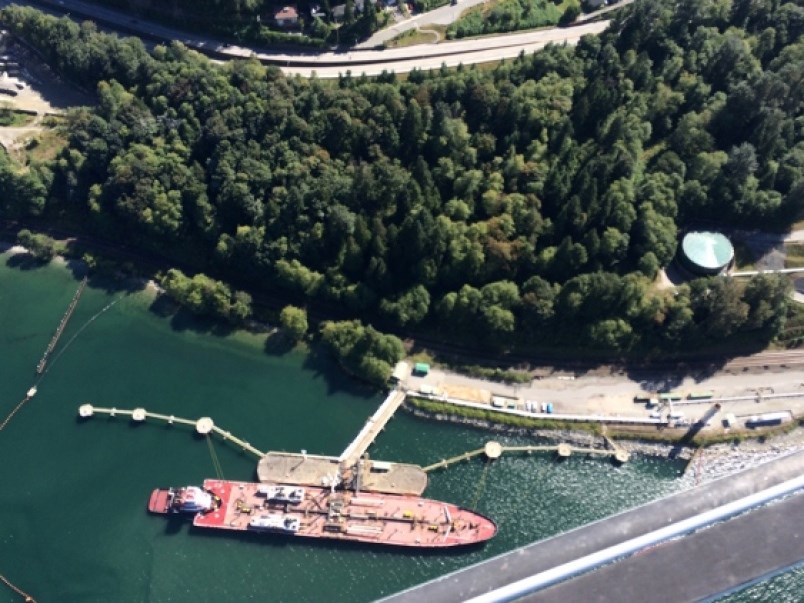North Shore First Nations and environmentalists vowed to keep fighting the Kinder Morgan pipeline expansion while Liberal MPs began the process of selling the decision to approve the project this week.
Immediately after Prime Minister Justin Trudeau announced the approval Tuesday, the Tsleil-Waututh called the decision “a big mistake” and predicted it would be greeted with both protests and court fights.
“We’re willing and able to go to court,” said Rueben George, spokesman for the band’s Sacred Trust anti-pipeline program, who travelled to Ottawa to make a last-ditch call for rejection of the project on Monday. “We’re ready and willing to do whatever it takes to stop this pipeline.”
Janice Edmonds of North Shore NOPE, an anti-pipeline group, disputed the 15,000 jobs Trudeau said the pipeline would bring, adding the Liberals haven’t accurately assessed the benefits and risks of the project.
“People are really angry,” she said. “Just because it’s approved doesn’t mean it’s going to be built. ... There’s going to be a huge outcry.”
Edmonds said Trudeau broke his election promise not to approve pipelines without community consent.
North Vancouver MP Jonathan Wilkinson defended the decision.
“At the end of the day, people oppose something for a reason,” he said – pointing to issues of spill response, climate change, impact on marine life and marine traffic in Burrard Inlet as among the concerns raised. “I think we have addressed those concerns.”
Wilkinson argued the pipeline didn’t negate the government’s commitment to combat climate change, saying the transition away from fossil fuels is expected to take over a decade and there will still be a demand for Canada’s oil in the developing world during that time.
Wilkinson said the decision to approve Kinder Morgan is “fully consistent” with Ottawa’s climate commitments.
He said there is a range of viewpoints on the pipeline among his constituents. “The majority are in the middle,” he said. “They have concerns and want to know they are being addressed in a thoughtful way and are open to conversation.”
West Vancouver - Sunshine Coast - Sea to Sky Country MP Pamela Goldsmith-Jones echoed similar thoughts about the decision. “I think it’s very, very difficult for many (constituents),” she said. “For others, they’re OK with it. I’m getting mixed response to be honest.”
“I have a deep respect for those who have worked for years to oppose this. I understand that,” she said, adding B.C. MPs “did all we could” to voice concerns about the project. “I also have to respect the fact in other parts of the country this is really important.”
Goldsmith-Jones also defended the decision against critics who have argued extracting and shipping more bitumen will result in more greenhouse gas emissions.
“This is absolutely on the path to transitioning to a low carbon economy,” she said. “It can’t happen overnight.”
Both Wilkinson and Goldsmith-Jones said the federal government is continuing to speak with both the Tsleil-Waututh and Squamish about their concerns, but added there are other First Nations along the pipeline route who are in favour of the project.
Burnaby North - Seymour MP Terry Beech, whose riding is most directly affected by the Kinder Morgan decision, could not be reached for comment despite numerous requests. Beech said in an email he would be available to his constituents and the media at an open house at his constituency office at 3906 Hastings St., from 9 a.m. to 5 p.m. on Saturday, Dec. 3.
Trans Mountain CEO Ian Anderson spoke to the media Wednesday morning, and praised the federal Liberal cabinet for the “courage and determination” they showed in making the decision, as well as Alberta Premier Rachel Notley for her support and B.C. Premier Christy Clark for “acknowledging the progress that’s been made on the needs of British Columbians.”
The merits of the $6.8-billion pipeline and the benefits that will accrue from it stand for themselves, Anderson added.
“We believe we put forward a project that’s based on the best technical, scientific and economic information,” he said.
But Anderson also acknowledged the many voices vowing to fight the project by any means necessary.
One of those expected to protest is Squamish Nation Chief Ian Campbell, who previously attended protests against the project at Burnaby Mountain.
“We’re not alone in our concern over the sustainability of these projects and the urgency to transition into better alternatives of sustainability and renewable resources. Standing Rock is a prime example that we’re not alone. There are many hundreds of thousands of people who stand with us in our grave concerns over these types of projects and the inherent risks,” he said. “Absolutely, I definitely support any of our members who wish to participate and mobilize with many other British Columbians in our disgust at what this represents for the foreseeable future.”
B.C. Premier Christy Clark said this week that Ottawa is “very close” to meeting the five conditions the province set for agreeing to the project.
Opposition Leader John Horgan criticized that, saying Clark needs to do more to “stand up for British Columbia.”



